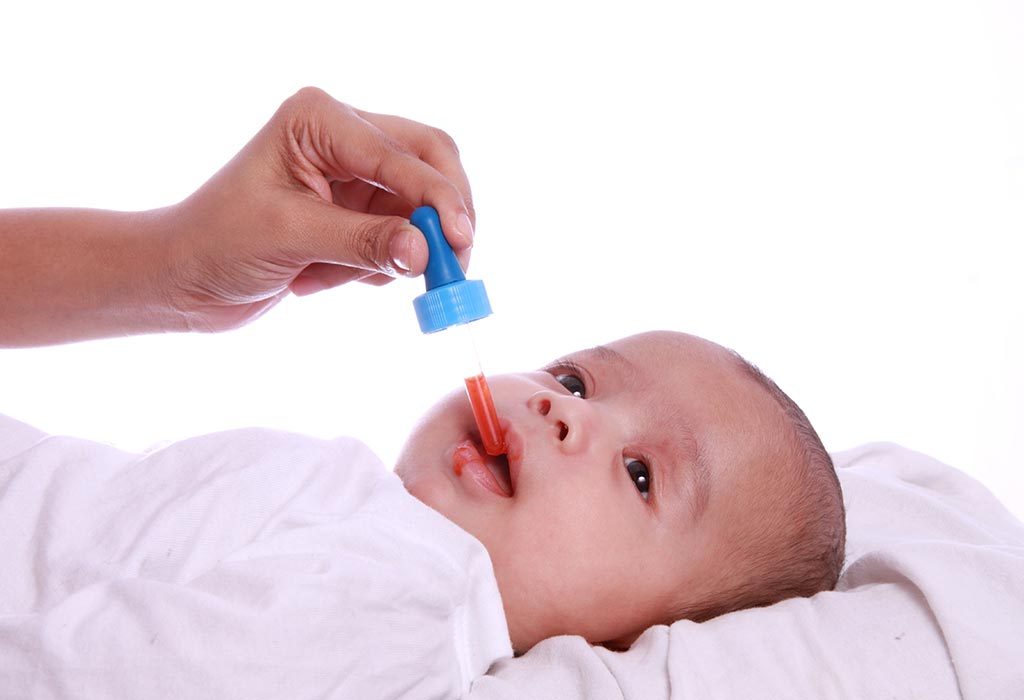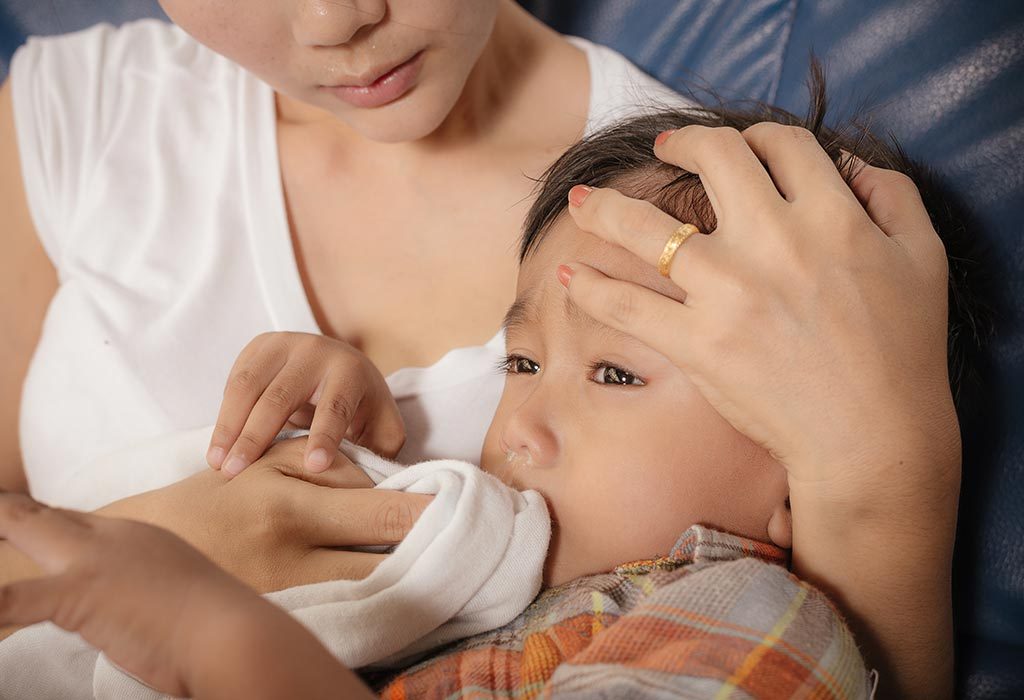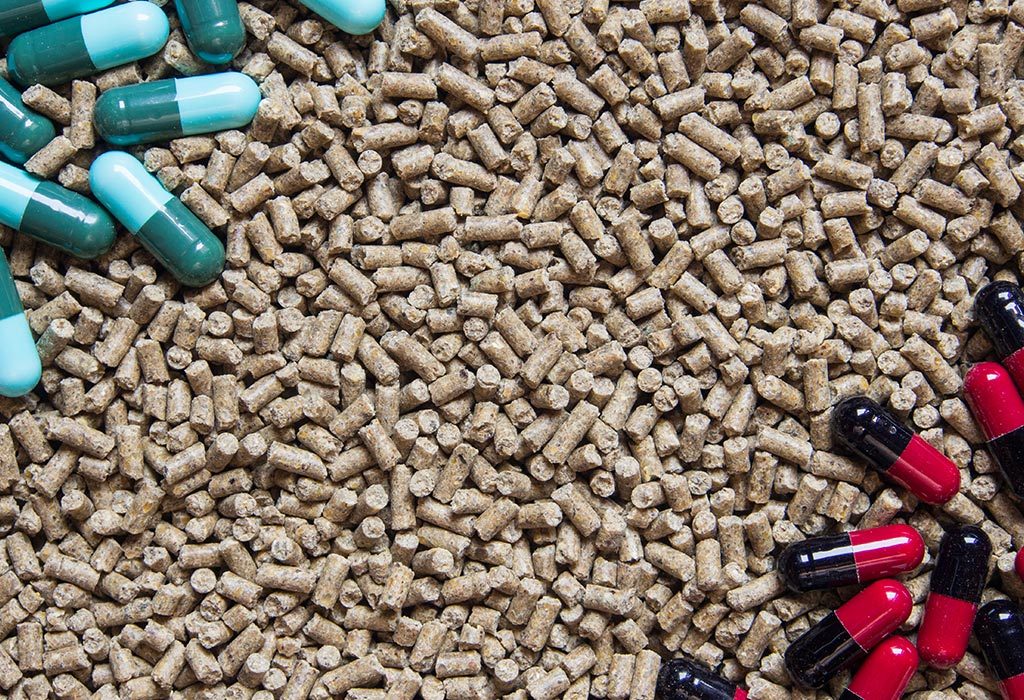In this Article
- What Are Antibiotics?
- Different Types of Antibiotics
- Are Antibiotics Safe for Infants?
- When Does Your Baby Need Antibiotics?
- When Do Babies Not Need Antibiotics?
- How Soon Do Antibiotics Start Working?
- Advantages of Antibiotics for Babies
- Side Effects of Antibiotics in Babies
- Risks Involved in the Overuse of Antibiotics
- How to Use Antibiotics Wisely
Antibiotics are life-saving drugs and can be heralded as one of the most important breakthroughs in medicine in the 20th century. Their use can successfully treat a number of life-threatening diseases and reduce suffering. Since babies have low immunity, they may be prescribed antibiotics too if they get a bacterial infection. However, their overuse can lower their effectiveness. So, what is it that a parent needs to know about antibiotics? The first question that would come to your mind if your baby is prescribed antibiotics is most likely to be – What are the side-effects? Well, this article will help you with all the information you need about antibiotics for babies, including their advantages and side effects. First, let’s understand what antibiotics are.
What Are Antibiotics?
Antibiotics are medicines that are made to destroy bacteria that cause diseases and infections. They work by interfering with the ability of the bacteria to feed, grow or reproduce, eventually killing them. Antibiotics are only effective against bacteria and cannot be used to cure illnesses caused by other organisms such as viruses and fungi.
Different Types of Antibiotics
Different antibiotics work differently on bacteria. There are, therefore, over 150 different antibiotics to treat everything, from minor infections to life-threatening diseases. Antibiotics are grouped into the following categories:
- Cephalosporins
- Fluoroquinolones
- Amoxicillin
- Penicillins
- Erythromycins
- Polypeptides
- Tetracyclines
- Aminoglycosides
- Streptogramins
- Sulfonamide
- Gentamicin
Out of these, the most commonly used are penicillin, amoxicillin, erythromycin, cephalosporins, and gentamicin. Now, let’s take a look at whether or not they are safe for babies.
Are Antibiotics Safe for Infants?
Antibiotics can be life-saving when babies contract deadly infections such as meningitis, pneumonia, urinary infection and bloodstream infections. They can be administered safely, but like many medications, antibiotics have some side effects too. Therefore, they should only be used when the need is justified.

Though life-saving, antibiotics cannot be administered all the time. Read on to know when your baby could need them, and when he could do without them.
When Does Your Baby Need Antibiotics?
Antibiotics are useful when babies are suffering from the following common ailments:
1. High Fever
A fever is an indication that the body is fighting off an infection. A child may have a high fever when the temperature is between 100-102 degree Fahrenheit. It is generally a symptom of a serious bacterial infection. Doctors may prescribe antibiotics such as amoxicillin, ampicillin or penicillin for such cases even when they aren’t entirely sure if it is a bacterial infection.
2. Ear Infections
When older children have ear infections, the norm is to wait for 1 to 2 weeks to see if it clears up on its own. Infants are an exception; they are unable to clearly express how much pain or discomfort they are in, and therefore, will need an antibiotic like amoxicillin. A severe infection can lead to symptoms such as excessive crying, sleeping difficulties, irritability, high fever, and tugging or pulling the ear.
3. Pneumonia
It’s tricky to determine whether pneumonia in babies is caused by virus or bacteria. Viral upper respiratory tract infections also have similar symptoms such as coughing, shortness of breath, fever and/or vomiting. Since complications from pneumonia in babies can often be dangerous, doctors don’t take chances and prescribe antibiotics even when the causal microbe is unknown.
4. Whooping Cough
Whooping cough can be effectively treated when antibiotics are started within the first week as soon as the symptoms like fever and mild cough are seen. Azithromycin is the commonly prescribed antibiotic and other options include erythromycin and clarithromycin.

5. Urinary Tract Infections
Urinary tract infections can occur when bacteria from the faecal matter or other areas enter the bladder or the kidneys. Irritability, diarrhoea, fever and vomiting are the normal symptoms of a UTI, and a diagnosis can be made using the results of a urine routine microscopy and urine culture.
6. Other Infections
Antibiotics are also prescribed for other bacterial infections such as strep throat and sinus infections. The common symptoms of these infections also include high fever, cold-like symptoms, and sometimes, body aches.
When Do Babies Not Need Antibiotics?
As mentioned earlier, antibiotics cure bacterial infections only. There are many conditions when your baby might not require any antibiotics. Most viral infections such as flu, bronchitis, croup, in spite of showing similar symptoms like cold, cough, and fever cannot be treated with antibiotics.
How Soon Do Antibiotics Start Working?
Once the treatment is started, most children feel better within 48 to 72 hours. However, it’s important to remember that feeling better is not a full recovery. The course of antibiotics must be completed so it can destroy all the bacteria that caused the disease. Stopping the course in between at the first sign of relief would allow the microbe to build resistance to the antibiotics, and the children may relapse in a short time and require stronger antibiotics.
By now, you must know that antibiotics can help treat bacterial infections. Here are some more advantages of antibiotics.
Advantages of Antibiotics for Babies
- Since the discovery of penicillin, the first antibiotic, and its widespread use since the 1940s, antibiotics have been used to treat diseases such as tuberculosis, pneumonia and meningitis, which were otherwise fatal.
- Antibiotics have saved millions of lives over the last 79 years. In fact, before the discovery of penicillin, one in every ten infants would succumb to bacterial infections.
- Antibiotics can curb the growth of diseases at an early age and also prevent long-term repercussions and disabilities due to those diseases.
With all the advantages, we would also like to keep you informed about the side effects antibiotics could have. Yes, just like all the other medicines, antibiotics also have side effects.
Side Effects of Antibiotics in Babies
Although antibiotics are life-saving drugs, they also come with side effects. Some side effects of antibiotics that babies are most likely to experience are as follows.
1. Symptomatic Effects
Babies can have symptomatic side effects from taking antibiotics such as a rash, an allergy, nausea (which results in poor appetite), vomiting, diarrhoea, stomach pain, light-headedness and headaches. Other types of antibiotics can damage the nerves involved in hearing and balance, and produce symptoms such as dizziness, nausea, and a ringing sound in the ears.

2. Antibiotics Destroy Useful Bacteria
Antibiotics must be used cautiously for babies under 6 months of age as they kill even the helpful bacteria that are present in their sensitive guts along with the infection causing ones. These helpful bacteria in the gut are needed for digestion and for protection against other infections. They keep a check on yeast such as Candida, which is naturally present in our bodies. Thus, a yeast infection can occur as a common side-effect of using antibiotics.
3. Immune System Damage
Antibiotics, while being a powerful weapon against diseases, can also be harmful to babies when used incorrectly. As mentioned earlier, antibiotics kill all the good bacteria in the gut. They may also impede the development of commensal bacteria that live in the gut. This could lead to long-term damage to the immune system as the bacteria in the digestive system contribute to the formation of immunity.
4. Allergic Reactions
Allergic reactions are more common to an antibiotic that belongs to the penicillin or sulphamide families. Babies having allergies to these antibiotics would experience hives, itchy rash, breathing difficulties, and inflammation either immediately or after a few days of starting the treatment.
5. Antibiotic Resistance
Bacteria, like all living organisms, can adapt and evolve to become resistant to antibiotics over time. This resistance is built when antibiotics are overused or used unnecessarily to treat viral infections. We shall talk a little about the risks involved in the overuse of antibiotics in the sub-head below. Antibiotic resistance also occurs because of using inappropriate antibiotics to treat the infection, or by not completing an entire prescribed course.
6. Superbugs
Antibiotic resistance can make bacteria so strong that any existing antibiotics cannot destroy them. These types of bacteria are called superbugs, which pose a real threat to babies because their infections could remain untreatable.
Risks Involved in the Overuse of Antibiotics
Antibiotic overuse is a major problem because many worried parents often demand them as a safety precaution to simple conditions such as common colds and flu. It’s much easier for a doctor to prescribe an antibiotic rather than take time and explain to the parents as to why it shouldn’t be overused.
Antibiotics are also available over the counter, and often, people self-medicate improperly. Some parents also give antibiotics to their babies when they are sick. This practice should be avoided completely to prevent further medical complications.
Agriculture and animal farming also use antibiotics extensively to fight diseases and improve their yield. The overuse of antibiotics is beefing up the bacteria while our immune systems are not strong enough to keep up with them naturally, which increases the risk of outbreaks of dangerous diseases.

When you and the paediatrician are 100% sure that your baby needs antibiotics, you need to ensure you keep a few things in mind to help your baby heal faster with no or fewer side-effects. Here’s how you can use antibiotics wisely.
How to Use Antibiotics Wisely
Antibiotics are so common these days that we forget they are potent drugs and that they come with consequences. However, if you give them to your baby at the right time and in the right way, your baby can benefit highly from them. Here are some things you must remember before giving antibiotics to your baby:
- Maintain good hygiene, even when your baby is on antibiotics. Make your baby wash his hands before and after every activity, especially before eating. If you feed your baby, sterilise every utensil used by them.
- Do not give antibiotics for viral infections such as cold or flu.
- Antibiotics should be taken exactly the way the doctor has prescribed.
- A full course of antibiotics should be given, even if your baby is feeling better.
- Never self-medicate or save antibiotics for later use.
- Do not dispose of them in the drain or garbage.
Although it is a double-edged sword, the proper use of antibiotics is safe and can help save lives. When it comes to your baby, ensure the doctor has made a complete diagnosis before prescribing him an antibiotic. Do not hesitate to ask questions and also be prepared for any side-effects the antibiotics might have on your baby.
References and Resources: health.harvard,healthychildren,fatherly









